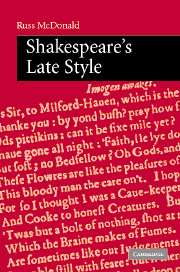1 - The idioms of the late tragedies
Published online by Cambridge University Press: 22 September 2009
Summary
Women are wordes, Men deedes.
Thomas Howell, 1581A point of origin for the late Shakespearean style does not immediately present itself. Analysis might reach as far back as 2 Henry VI or Love's Labour's Lost, since even these very early texts contain the roots and forecast the development of the main stylistic features in the late plays. In other words, since Shakespeare's treatment of dramatic poetry developed over the course of his career, and since the late verse represents a metamorphosis or revision of earlier poetic practices, any decision about where to begin is to some degree arbitrary. Practically speaking, however, a later starting point is necessary. One of the ambitions of this book is to show that the distinctive properties discernible in the late verse are intimately related to the shift from tragedy to romance, that the altered style and the new mode express Shakespeare's renewed sense of values and refreshed artistic purpose. A concomitant goal is to demonstrate that this exchange of modes may be ascribed, at least in part, to Shakespeare's evolving and contradictory opinions about language itself, so that his rejection of tragedy derives also from conflicted and developing opinions about the stage and about his own professional status. Therefore I begin with the distinctive idioms of three tragedies written just before, or perhaps just as, Shakespeare took up the form of dramatic romance: Macbeth, Coriolanus, and Antony and Cleopatra.
Collectively, these tragedies constitute a kind of pivot for the shift from one mode to the other.
- Type
- Chapter
- Information
- Shakespeare's Late Style , pp. 42 - 76Publisher: Cambridge University PressPrint publication year: 2006



